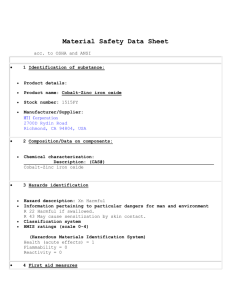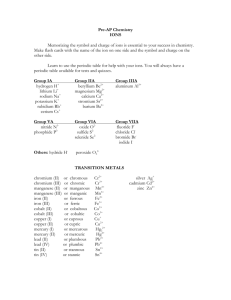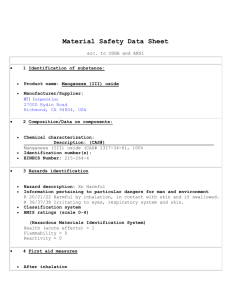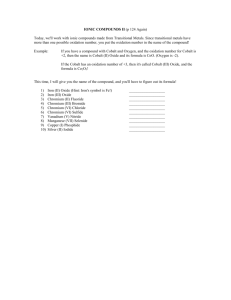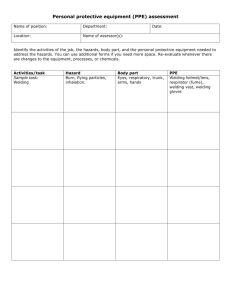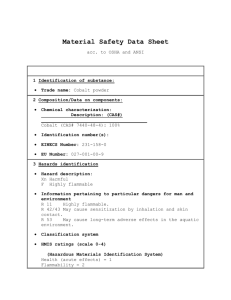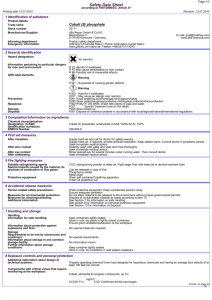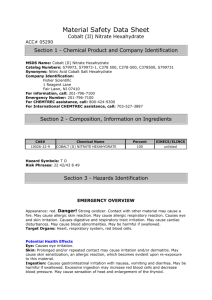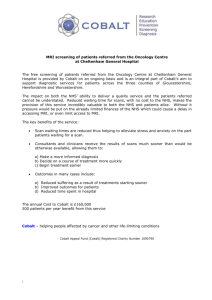Stellite 6 MSDS - Weld
advertisement
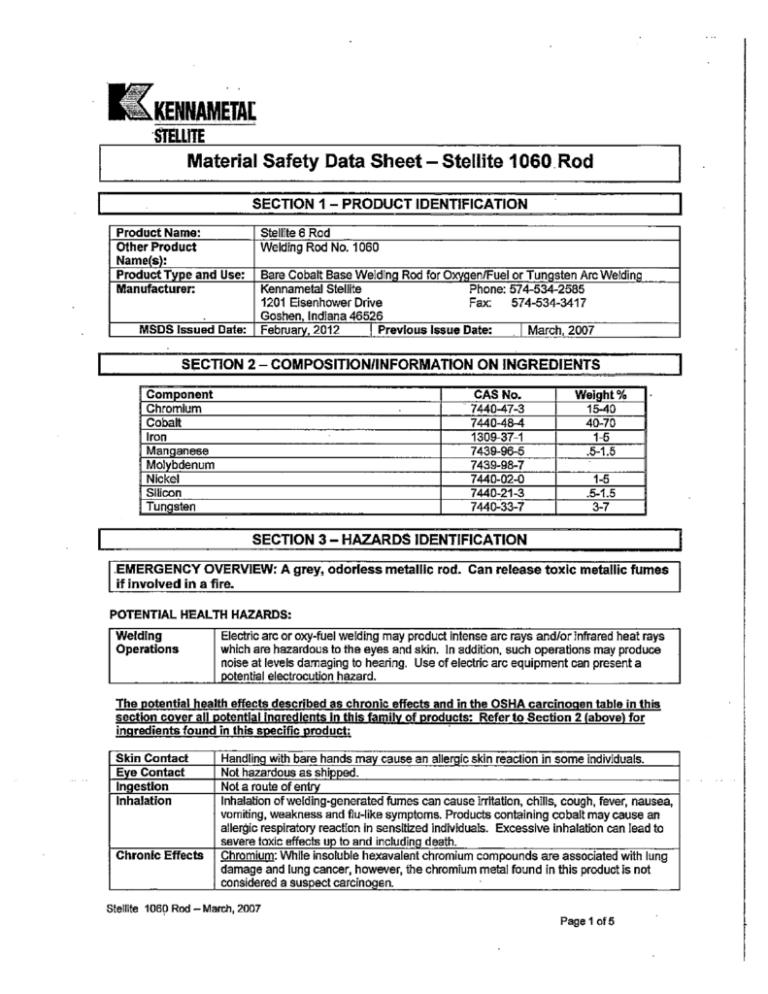
KENNAMETAL
STELLITE
Material Safety Data Sheet Stellite 1060 Rod
—
SECTION ‘1
-
]
PRODUCT IDENTIFICATION
.
Product Name:
Other Product
Name(s):
ProductTvpe and Use:
Manufacturer:
Stellite 6 Rod
Welding Rod No. 1060
Bare Cobalt Base Welding Rod for Oxvaen!Fuel or Tungsten Arc Welding
Kennametal Stellite
Phone: 574-534-2585
1201 Eisenhower Drive
Fax:
574-534-3417
Goshen, Indiana 46526
February, 2012
I Previous Issue Date:
I March, 2007
MSDS Issued Date:
SECTION 2— COMPOSITIONIINFORMATION ON INGREDIENTS
Component
CAS No.
Chromium
Cobalt
Iron
7440-47-3
15-40
7440464
Manganese
7439-96-5
40-70
1-5
.5-1.5
Molybdenum
Nickel
Silicon
7439-98-7
7440-02-0
7440-21 -3
Tungsten
744 0-33_7
1309-37-I
SECTION 3
—
Weight%
1-5
.6-1.5
3-7
HAZARDS IDENTIFICATION
EMERGENCY OVERVIEW; A grey, odorless metallic rod. Can release toxic metallic fumes
if involved in a fire.
POTENTIAL HEALTH HAZARDS:
Welding
Operations
Electric arc or oxy-fuel welding may product intense arc rays andlor infrared heat rays
which are hazardous to the eyes and skin. In addition, such operations may produce
noise at levels damaging to hearing. Use of electric arc equipment can present a
potential electrocution hazard.
The potential health effects described as chronic effects and in the OSHA carcinogen table in this
section cover all potential ingredients in this family of Droducts: Refer to Section 2 (above) for
ingredients found in this specific product:
Skin Contact
Eye Contact
Ingestion
Inhalation
Chronic Effects
Handling with bare hands may cause an allergic skin reaction in some individuals.
Not hazardous as shipped.
Nota route of entry
Inhalation of welding-generated fumes can cause irritation, chills, cough, fever, nausea,
vomiting, weakness and flu-like symptoms. Products containing cobalt may cause an
aller~ic respiratory reaction in sensitized individuals. Excessive inhalation can lead to
severe toxic effects up to and including death.
Chromium: While insoluble hexavalent chromium compounds are associated with lung
damage and lung cancer, however, the chromium metal found in this product is not
considered a suspect carcinogen.
Stellite 1080 Rod—March, 2007
Page 1 ot5
IVISDS
-
~
•
—
Stellite 1060 Rod
Cobalt: Cobalt has caused cancer in laboratory animals and is associated with lung
injury and effects upon the circulatory system.
Nickel metal is considered to be possibly carcinogenic to humans. Long-term
overexposure to nickel compounds may cause lung damage (fibrosis or
pneumoconiosis). Soreness and itchiness of The nose and change in skin color and/or
appearance may also result
Manganese: Repeated inhalation of manganese dust or fume can cause irreversible•
damage to the central nervous system resulting in symptoms similar to Parkinson’s
disease. Manganese is also associated with chronic lung disease and potential
reproductive effects.
Molybdenum: Molybdenum is considered an animal carcinogen based on laboratory
test.
Potential ingredients found on one of the OSHA designated Carcinogen Lists are listed below.
~ Ingredient Name
NTP Status
1ARC Status
OSHA Status
Cobalt metal
28— Possibly carcinogenic
Nickel metal
Suspect carcinogen
2B Possibly carcinogenic
—
—-
—
—-
SECTION 4— FIRST AID MEASURES
Skin Contact
Eye Contact
Ingestion
Inhalation
Wash with soap and water. Get medical assistance for irritation or allergic reaction.
I Not a route of entry.
I Not a route of entry.
(Welding fumes) Remove to fresh air. Get immediate medical assistance if breathing is
difficult or has stopped. Get medical assigtance for persistent irritation.
Advice to Physician I Treat symptomatically.
SECTION 5— FIRE FIGHTING MEASURES
Flash Point and Method
None
Autoignitlon Temperature
Not determined
Upper! Lower! Flame Limits
Not applicable
Extinguishing Media to Use
Use media suitable for surrounding structural fire.
Extinguishing Media té Avoid None (see below)
Special Fire Fighting
Avoid skin contact and wear self-contained breathing apparatus to avoid
Procedures
inhalation of fumes.
Unusual Fire and Explosion
None normally presenL
Hazards
SECTION 6
—
ACCIDENTAL RELEASE MEASURES
I
In case of spill
Wear appropriate personal protective equipment. Pick up spilled materials and place
into containers for use and/or disposal.
Spills may be reportable to the National Response Center or other agencies. See section 15 for ‘reportable
quantities’ (RQs) that may exist
I
SECTION 7— HANDLING AND STORAGE
I
Use this product in accordance with ANSI Z49.1 ~Safety in Welding, Cuffing and Allied ProcesseC and in
compliance with OSHA welding regulations, 29CFR1910.252-255 (as appropriate).
Normal Handling Avoid contact with skin. Do not breathe welding fumes
Storage
Keep containers closed and store in a dry area. Do not store where contamination with
Stellite 1060 Rod March, 2007
Page 2 of 5
—
I
MSDS
—
SteIlite 1060 Rod
foreign materials may occur. Avoid storage next to acids. Avoid storage near sources
of combustion.
.
SECTION 8
—
EXPOSURE CONTROLSIPERSONAL PROTECTION
Exposure limits for possible ingredients:
Ingredient
ACGIH TLV
Chromium metal
0.5 mg/m3TWA
Cobalt metal
0.02 mgIm~TWA
OSHA PEt
1 nwfnt’TWA
0.1 mg!m4TWA
(dust and fume)
10 mg/m3TWA
(respirable)
5 mg/rn3 Ceiling (fume)
.
iron (as iron oxide)
5 mg!m”TWA
(dust and fume)
0.2 mg/m3TWA
.
Manganese metal
.
10 mg/md TWA
(inhalable fraction)
3mgIm3TWA
(respirable fraction)
1.5 mg/ni’TWA
None
Molybdenum metal
Nickel metal
Silicon
*
*
15 rnglm4 TWA
(total dust)
1 mgIm6lWA
15 mgIm~TWA
5 mg/ni3 TWA
(respirable)
None
.
Tungsten metal
*
5 mg/rndTWA
10 mg/rn3 STEL
None
Other Limit
0.5 mg m4TWA
0.05 mg m4 TWA
(dust and fume)
5 rngIm~’TWA
(dust and fume)
mglm3
(fume)
5 mg/rn6 TWA
~
*
*
.
0.015 mg/m6TWA
10 mg/md TWA (total)
5 mg/rn3 TWA
(respirable)
5 mglm3 TWA
*
Welding Fumes
None established
Lowest Feasible
(produced during use)
Concentration
~ = NIOSH
NIOSH 1WA’s are based upon a 10 hour day (va 8 hrs for OSHA and ACGIH).
*
-
Engineering
Controls
Provide local exhaust ventilation at areas where material is being used in welding
operations. Ventilation should maintain exposure levels belowthe exposure levels
listed above.
Personal Protective Equipment
Skin Protection
Wear head, hand, and body protection which help to prevent injury from radiation,
sparks, and electrical shock. See ANSI Z49.1 at a minimum this includes welde?s
gloves
andprotection
a protective
faceas
shield,
may include
amiTrain
protectors,
aprons,
shoulder
as well
dark and
substantial
clothing.
the welder
not hats,
to touch
.
.
•
Eyes Protection
.
RespIratory
Proteätlon
live electrical parts and to insulate himself from work and ground.
Wear helmet or use face shield with filter lens. As a rule of thUmb, start with a shade
that is too dark to see the weld zone. Then go to the next lighter shade which gives
sufficient view of the weld zone. Provide protective screens and flash goggles, if
necessary, to shield others.
Use air-purifying fume respirator or air supplied respirator when welding in confined
space or where local exhaust or ventilation does not keep exposure below TLV.
SECTION 9
A
~ ~_j_
npjjcaiai.uc ~ rlfyafl.ai OWW
Odor
Specific Gravity
Melting Point
Freezing Point
Vapor pressure
pH
Flash Point and Method
Stellite 1060 Rod March, 2007
—
PHYSICAL AND CHEMICAL PROPTERIES
~,I:
4
‘.~Iay piletalilu vu
None
8.38
2,475 °F
2,300 °F
None
Not applicable
None
—
Page 3 of 5
MSDS
Autoiqniflon Temperature
Lower! Flame Limits
—
Stellite 1060 Rod
I Not determined
I Not applicable
I
SECTION 10— STABILITY AND REACTIVITY
Chemical Stability
Conditions to Avoid
Hazardous
Decomposition Products
Possibility of Hazardous
Reactions
.
—
Acute
Toxicity
Chronic
Toxicity
.
Material is normally stable.
Do not allow contact with inorganic acids. Flammable hydrogen gas may be
released.
Oxides of-metal components and oxides of organic fluxes used in the
welding process may be formed, Inhalation should be avoided.
Material will not polymerize or undergo self-reactions.
SECTION 11
-
I
TOXICOLOGICAL INFQRMATION
Cobalt LD50 (oral, rat)—6171 mg/kg
Manganese: LD~ (oral, rat) —9 g/kg
Silicon: LD50 (oral, rat) —3160 mglkg
Chromium: Although hexavalent forms of insoluble chromium are considered to be lung
carcinogens, trivalent compounds and chromium metal are not associated with cancer.
Cobalt: Cobalt has caused cancer in laboratory animals and is associated with lung injury
and effects upon the circulatory system -(myàcardial effects).
Manganese: Repeated inhalation of manganese dust or fume can cause irreversible
damage to the central nervous system resulting in symptoms similar to Parkinson’s
disease. Manganese is also associated with chronic lung disease and reduced
reproductive vitality in males (based on studies of male workers in manganese
production).
Molybdenum: An animal carcinogen. (Lung cancer— rats) Relevance to human health is
uncertain.
Nickel: Classified as a suspect carcinogen by NTP and as an animal carcinogen by
IARC. Chronic exposure is associated with lung damage (fibrosis or pneumoconiosis).
Soreness and itchiness of the nose and change in skin color andIor appearance may also
result Nickel can also cause allergic sensitization via contact.
SECTION 12— ECOLOGICAL INFORMATION
Chromium content classifies This product as hazardous to the environment if discharged. Both chromium
and nickel may be persistent in the environment.
-
SECTION 13— DISPOSAL CONSIDERATIONS
Is unused product a RCRA Hazardous Waste if
No
discarded?
I If yes, the RCRA waste identIficatIon number is: I
—-
Always dispose of in accordance with Federal, State and Local regulations.
I-
SECTION 14- TRANSPORT INFORMATION
DOT Classification
UN Identification Number
DOT Shipping Description
Not regulated
Not applicable
Not applicable.
Stellite 1060 Rod—March, 2007
Page 4 of 5
NISDS
—
Stellite 1060 Rod
SECTION 15— REGULATORY INFORMATION
f All ingredients are listed on the Toxic Substances Control Act Inventory
Toxic Substances Control Act
I ~f Chemical Substances.
• SARA 311 Hazard Class
I Immediate, delayed
~ SARA 313: This product may contain certain toxic chemicals subject to the reporting requirements of
• [~çction 313 of the Emergency Plannin~ Community Right-To-Know Act of 1988 and 40 CER 372:
~ Ingredient
C.A.S. No.
Maximum Wt % in this Product
Chromium
7440-47-3
31
•
Cobalt
7440-484
60
Manganese
7439-96-5
2
Nickel
7440-02-0
3
[~portable Quantities and Threshola Planning Quantities: The following possible ingredients have
[çgRCLNSARA Reportable Quantities (RQ5) and/or Threshold Planning Quantities (TPQs).
Ingredient
RQ
TPQ
Chromium
5000 lbs
None
(for particles whose_diameter_is_less_than_0.004”)
Cobalt
1 lb. (compounds of cobalt only)
None
Cobalt metal has no RQ
Manganese
1 lb. (compounds of manganese only) Manganese
None
metal_has no_RQ.
Nickel
100 lbs
None
(for particles whose diameter is_less_than_0.004”)
{ii~te Right to Know Lists: In addition to ingredients listed in section 2, the following information is
LPLesented for state right to know purposes.
Ingredient
Comment
Cobalt
Listed on the California Proposition 65 carcinogen list.
Nickel
Listed on the California Proposition 65 carcinogen list.
[~&eign Inventory
The ingredients of this product are on the following chemical control inventories:
Status:
Australia, Canada (DSL), China, European Union, Korea, Philippines
WHMIS Classification
D2A This product has been classified in accordance with hazard criteria of the
Controlled Products Regulations and the MSDS contains alt the information
required by the Controlled Products Regulations.
.
-
.
SECTION 16— OTHER INFORMATION
Changes to this datasheet
from previous version:
July 2003- New MSDS format. Modification of hazards text in
section 3. first aid information in section 4. Updated regulatory
references and performed a general rewrite of entire MSDS.
March 2007— Section 8. Updated exposure limits for Iron,
Manganese, Silicon and Welding Fumes. Also updated Calcium
Carbonate and Titanium Dioxide if applicable. Data for changes
came from 2006 ACGIH “Guide to Occupational Exposure Values”
February 2012— Updated manufacturer to Kennametal Stellite in
Goshen. IN.
NFPARatings
Health: i~
LThRIC ‘lilt D.~fInno
IJa.sIIk~
Stellite 1060 Rod March, 2007
*
Fire: I
I
Ch-,.. I
~--~
-Reactivity: 0
Dk.,~.;,.-.I Li~,...-,...1. fl
—
Page 5 of 5
